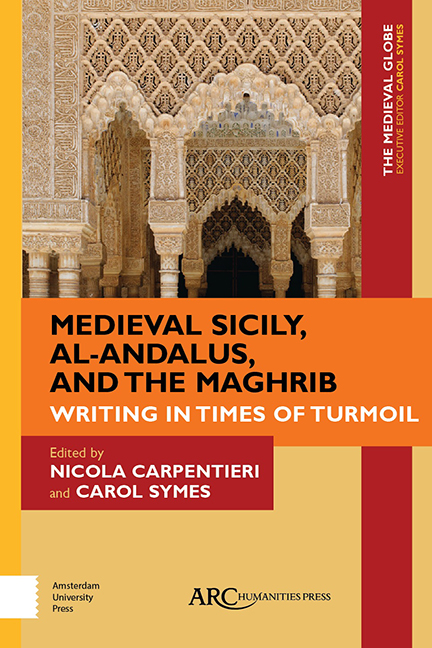Book contents
- Frontmatter
- Contents
- Acknowledgements
- Introduction
- The Indiculus luminosus and the Creation of a Ninth-Century Prophetic Conflict between Christianity and Islam
- Empire and Caliphate in the Life of John of Gorze
- The Writing of Munāẓarāt in Times of Turmoil: Disputations inFatimid Ifrīqiya
- Messaging and Memory: Notes from Medieval Ifrīqiya and Sicily
- “And God Dispersed Their Unity”: Historiographical Patterns in Recounting the End of Muslim Rule in Sicily and al-Andalus
- A Wondrous Past, a Dangerous Present: The Egyptian Temple of Akhmīm and the Martorana Church in Palermo, as Seen through Ibn Jubayr’s Travelogue
- How Does a Moorish Prince Become a Roman Caesar? Fictions and Forgeries, Emperors and Others from the Spanish “Flores” Romances to the Lead Books of Granada
- Index
The Writing of Munāẓarāt in Times of Turmoil: Disputations inFatimid Ifrīqiya
Published online by Cambridge University Press: 20 November 2020
- Frontmatter
- Contents
- Acknowledgements
- Introduction
- The Indiculus luminosus and the Creation of a Ninth-Century Prophetic Conflict between Christianity and Islam
- Empire and Caliphate in the Life of John of Gorze
- The Writing of Munāẓarāt in Times of Turmoil: Disputations inFatimid Ifrīqiya
- Messaging and Memory: Notes from Medieval Ifrīqiya and Sicily
- “And God Dispersed Their Unity”: Historiographical Patterns in Recounting the End of Muslim Rule in Sicily and al-Andalus
- A Wondrous Past, a Dangerous Present: The Egyptian Temple of Akhmīm and the Martorana Church in Palermo, as Seen through Ibn Jubayr’s Travelogue
- How Does a Moorish Prince Become a Roman Caesar? Fictions and Forgeries, Emperors and Others from the Spanish “Flores” Romances to the Lead Books of Granada
- Index
Summary
THIS CHAPTER CONTEXTUALIZES two accounts of disputations (munāẓarāt) from the early Fatimid period in North Africa (909– 969) and their subsequent inclusion in biographical literature. Far from being objective accounts of polemical exchanges— as they are often treated in modern scholarship— these narratives reflect the uncertainties of their authors during a particular time of religious and political turmoil within the Muslim Mediterranean. Moreover, in their attempts to advance their own status through these writings, these authors made broader claims for the factions with which they were affiliated, in order to crystallize and legitimize competing political and religious identities.
The first and best known is an account of disputations between the local Mālikī scholar Saʿīd ibn al-Ḥaddād (d. 915) and the newly arrived Fatimid dāʿī (agent or missionary, literally “summoner”) Abū-l-ʿAbbās (d. 911). However, the earliest version of al-Ḥaddād's narrative is preserved in the Mālikī biographical dictionary of Muḥammad b. Ḥārith al-Khushanī (d. ca. 981), completed many years later in al-Andalus and apparently at the request of his patron, the Umayyad crown prince al-Ḥakam II (r. 961– 976). The second is an account by the Fatimid dāʿī Ibn al-Haytham (d. after 953) of disputations and discussions with the above-mentioned dāʿī Abū-l-ʿAbbās and his brother, the revolutionary leader Abū ʿAbd Allāh al-Shīʿī (d. 911), both of whom were subsequently executed for treason. This account, too, is temporally distant from the events it describes, since al-Haytham wrote it down almost forty years later, during the final year of a rebellion (943– 947) which almost toppled the Fatimids. I accordingly place these disputations and their documentation in the wider context of inter-Islamic political and religious rivalries: among the Fatimids of al-Mahdiyya, the Umayyads of Córdoba, and the Abbasids of Baghdād (on the one hand) and within the ideologically charged controversies over logic and philosophy (on the other).
The major historical event that marks the starting point for this essay is the revolution of 909, which ended the Aghlabid emirate (800– 909) in Ifrīqiya and brought the Shīʿī Fatimid dynasty (909– 1171) to power.
- Type
- Chapter
- Information
- Medieval Sicily, al-Andalus, and the MaghribWriting in Times of Turmoil, pp. 59 - 86Publisher: Amsterdam University PressPrint publication year: 2020



